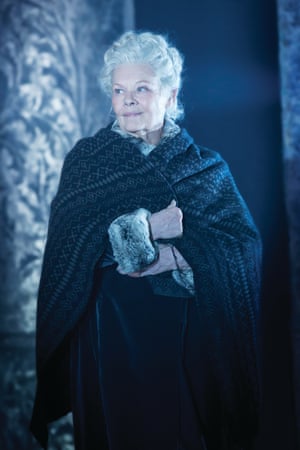Bylam, widzialam, zapamietalam. Po raz pierwszy tak blisko gwiazd ale na ekranie. Wszystko na zywo. Mowa o Opowiesci zimowej Wiliama Szekspira. Produkcja Kennetha Branagha, ktora transmitowana byla na caly swiat. Widzimy ludnosc przed teatrem w ladku na West Endzie, w srodku i cala widownie a siedzimy sobie na wsi w kinie. Taka to technika. Bez reklam z cisza zaklocana jedynie smrodem cial i zarciem. 26 listopada to pierwszy przekaz sztuki zrealizowanej na scenie teatru Branagha - Garrick Theatre. Ciocia tam byla i siedziala juz na Priscilli. Bo na Blithe Spirit z Angela Lansbury byla w Gilgud Theatre.
Samo przedstawienie troche przeinaczone. Wita nas swiateczna wizyta w domu edwarianskim. Czechy i Sycylia zgadza sie co do joty. Same amory mlodych juz przy muzyce skocznej i wplatane elementy musicalu. W sumie wszystko sie zgadza, wierna kopia oryginalu. Same pysznosci w grze aktorskiej Judi Dench i samego rezysera i producenta Kennetha Branagha.
Ciocia kontest jest i ubawiona.
T
he curtain has not yet gone up, but the tinkling of a musical box brings a hush to the auditorium at the beginning of The Winter’s Tale, one of a six-play season performed by Kenneth Branagh’s new West End theatre company. The Winter’s Tale is possibly Shakespeare’s most perfect play with its rhythm of lost and found – a tarnished fairytale that redeems itself. It’s a play that, when it works, casts a spell like no other, and this production, co-directed by Branagh and Rob Ashford, is magical. It is hard to imagine the play more movingly performed. It’s a gift to eye and heart.
It begins in an unashamedly Christmassy way, with a tree on stage, home movies featuring Leontes (Branagh) and Polixenes as flickering boys in sailor suits, and snow (much of it tossed into the stalls). But if Christopher Oram’s Edwardian Christmas card set (Polixenes gets ice skates as his Christmas present) sounds cosily sentimental, do not be misled. The production is governed by sentiment, not sentimentality, by the holiness of the heart’s affections and a warmth too precious to cast lightly aside.
But in The Winter’s Tale, misery comes out of nowhere like the worst of winter weather. Leontes, the Sicilian king, needs no Iago to ignite his jealousy. He believes his wife, Hermione, and childhood friend, Polixenes, are lovers. Branagh moves like a tormented dancing master in black coat and red waistcoat, talking sweetly to his son before reeling back into husbandly gall. His inability to listen is part of his sickness. Jealousy starts quietly, talks to itself. But as it escalates, his hands rise to his cheeks as if he were supplying himself with panicky blinkers. What makes this such a tremendous performance is that he never subdues emotion. We are used to seeing Shakespeare underplayed. What is unusual, brave and overwhelming to behold is Branagh’s embrace of the chaos in the part – he even howls to rival King Lear.
Hermione (Miranda Raison) is beautifully played – blazing and cool simultaneously. You hear her controlled anger when, falsely accused, she speaks of “honour”. Honour is also a trigger for Judi Dench’s Paulina – the word catches in her throat. Paulina is one of Shakespeare’s great fixers, but Judi Dench grants her wisdom and compassion. The play is in part about the art of reading faces, and Dench is at her most tender showing Leontes his new baby in hope that he might thaw. She shines as mistress of ceremonies with her low, musical, unmistakable voice (such virtuosity and diction at 80!).
Meanwhile, in Bohemia, Jessie Buckley’s Perdita is a joyous advertisement for the rural life, a free spirit who whips herself up into ecstasy over the flowers she offers friends. Tom Bateman is also delightful as Florizel, her infatuated swain: “Apprehend nothing but jollity,” he says, and you feel sure while he is in the vicinity, jollity will prevail. There is no weak link in the cast. Hadley Fraser’s Polixenes is handsomely wronged, John Shrapnel’s Camillo is subtle and believable. The matchless Michael Pennington’s Antigonus meets his end too soon in the clutches of a bear. John Dagleish’s Autolycus is a beguiling conman.
Back at court and before the ending that will change everything, we re-encounter Leontes as a sombre figure, snow melting on to his black coat. He is about to show us something unforgettable – that it is possible to be heartbroken by hope.
The plays will be seen on more than 1,300 screens worldwide, from Argentina to the US, with more than 500 in the UK.
• The Winter’s Tale plays 17 October 2015 until 16 January 2016 at the Garrick theatre, London.http://www.theguardian.com/stage/2015/nov/15/winters-tale-review-kenneth-branagh-judi-dench-harlequinade-all-on-her-own-

